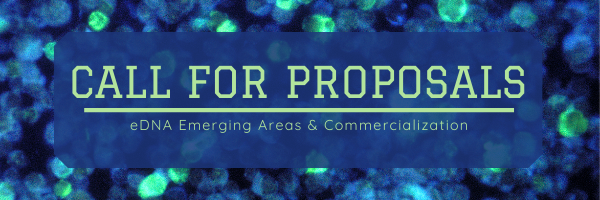
Call for Proposals: eDNA Emerging Areas & Commercialization Seed Grants
Maine’s iconic coastline is one element of a complex macrosystem linking inland lakes and rivers to the sea through watersheds, estuaries, and nearshore coastal waters to the open Gulf of Maine. The overarching hypothesis of Maine-eDNA is that we can transform our understanding of the ecological dynamics and sustainability of Maine’s coastal macrosystem through innovations in environmental DNA (eDNA) science that unlock new spatiotemporal and taxonomic scales of inference.
One of the objectives of the Maine-eDNA project is to encourage valuable contributions from researchers in emerging areas of eDNA technology and its application to marine ecosystem monitoring (Option 1). We seek one-year seed grant proposals to be reviewed and awarded on a competitive basis, with total project costs up to $20,000. For proposals that include the commercialization of eDNA technology in the scope of work (Option-2), the PI will be eligible to apply for additional matching funds from MTI, with the potential to receive an additional $20,000.
Institutions and individuals associated with Maine-based research organizations, companies and community organizations are eligible to apply. Early career researchers and entrepreneurs are particularly encouraged to apply, as are individuals from groups who are underrepresented in STEM (women, persons with disabilities, blacks, Hispanics, and American Indians).
Research priority areas are:
- Priority area 1 – Environmental DNA Technologies: Includes sampling technologies, molecular tools, novel detection methods, bioinformatic tools, data management and visualization technologies. Technologies that advance widespread needs in the field, emerging environmental monitoring needs, and/or community participation and well-being are strongly encouraged.
- Priority area 2 – Sustainable Seafood and Seaproducts: Includes ways that eDNA can improve sustainability and economic value of seafood products, whether aquacultured or harvested. Could include eDNA for improved aquaculture practices (e.g., farm siting), reducing harvest bycatch, improving seafood safety (e.g., pathogen testing), seafood traceability, that benefit Maine’s marine fisheries and aquaculture sectors.
Deadline is July 15, 2021. For more information and requirements, please download the pdf below. Proposals can be sent to: maine.epscor@maine.edu, and should explicitly state preferences for Options 1 or 2 and Priority Areas 1 or 2 in the application.
A training regarding this RFP was held on Tuesday, June 15th. If you would like to access the recording, please follow this link.
FAQs:
– If I’d like to know who is working on the Maine-eDNA grant to consider as potential collaborators, where do I find that information?
Answer: https://umaine.edu/edna/people/department/researcher/
– If I’m collaborating with someone on the Maine-eDNA grant, should the person who is already being supported by the grant be listed as the PI?
Answer: Either you or the Maine-eDNA researcher can be listed as PI.
– Is there any drawback to choosing the Commercialization option if there isn’t a preliminarily clear research outcome?
– Is there a limit on the number of proposals a PI can be involved in?
Answer: A limit was not stated; Acceptance is purely based on the merit of the proposal(s).
– Are both parts of the 2-step process due on July 15th?
Answer: The Maine-eDNA aspect is due on July 15th, and for continuity it is suggested that applicants submit the MTI proposal by Fall 2021 at the latest. If this isn’t possible and a long delay is preferred, that also can be considered by the PI. It’s good to think of this process as a pathway, and not a guaranteed outcome. For example, one may be granted the Maine-eDNA funding, but not receive the MTI funding. However, it is the goal of the Maine-eDNA team to get you and your team on the proper footing.
Follow up questions should be addressed to Ali Abedi (Ali.abedi@maine.edu).
